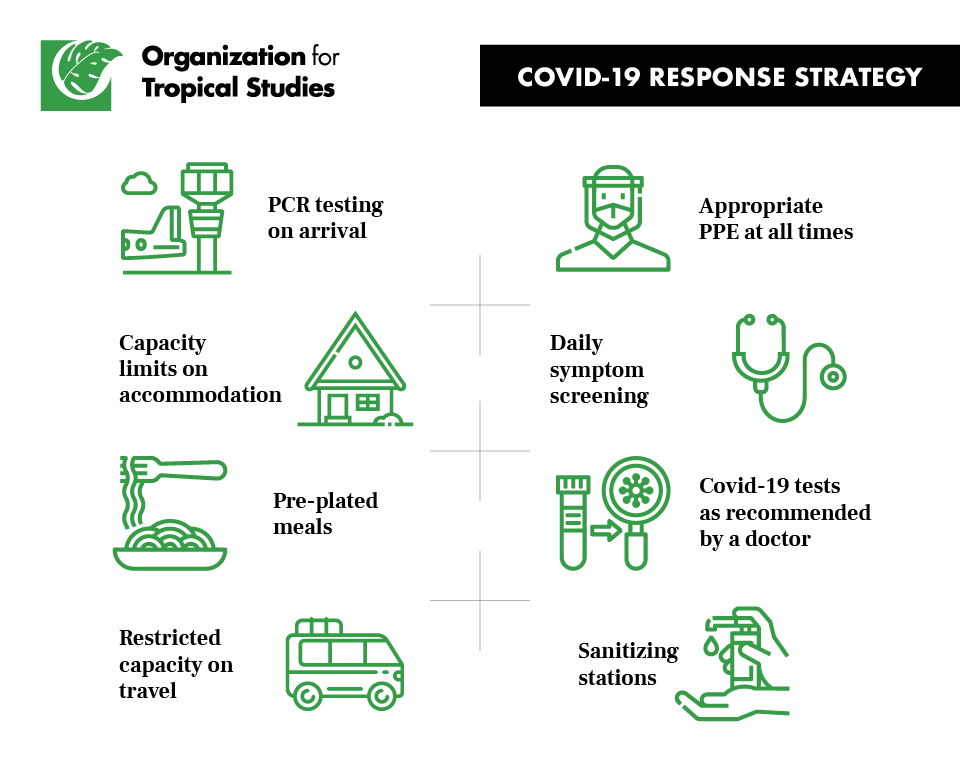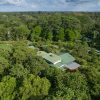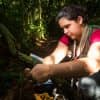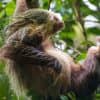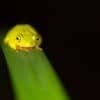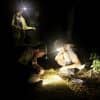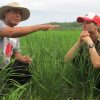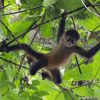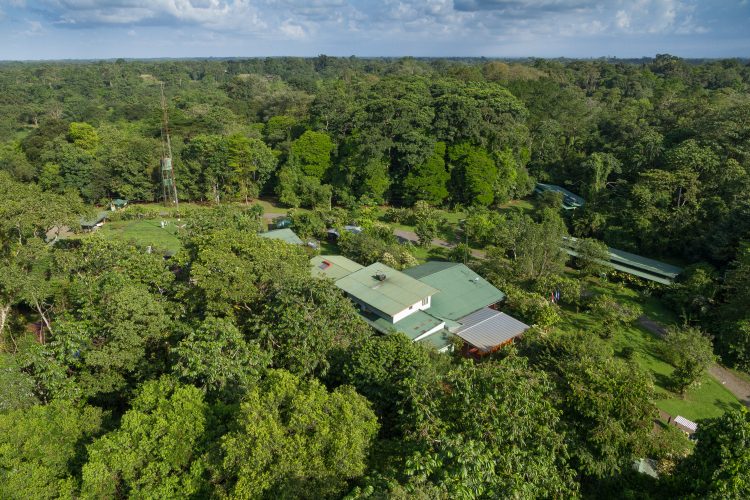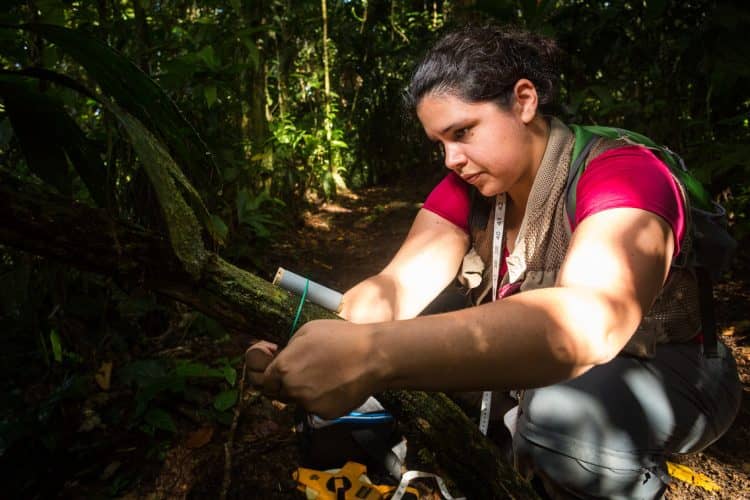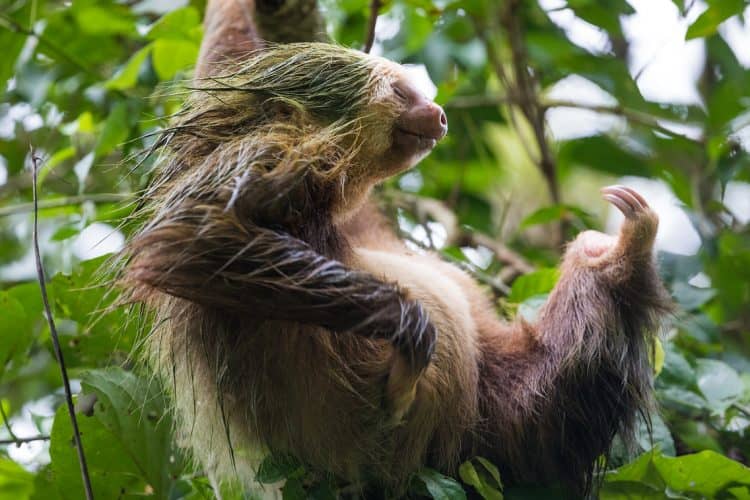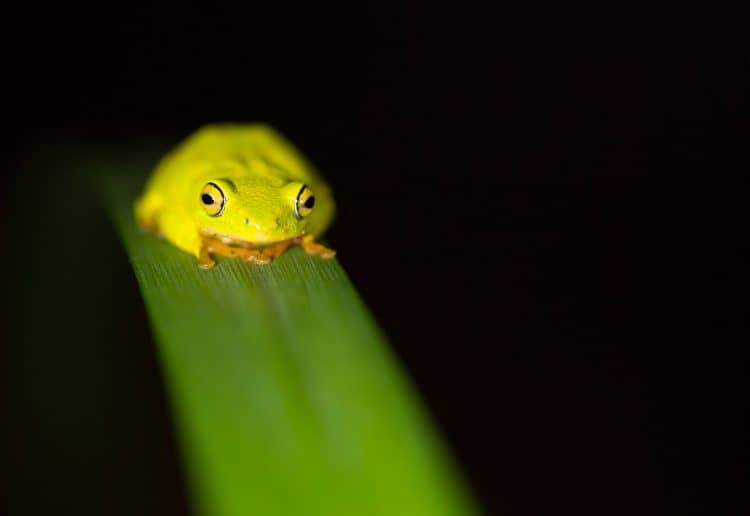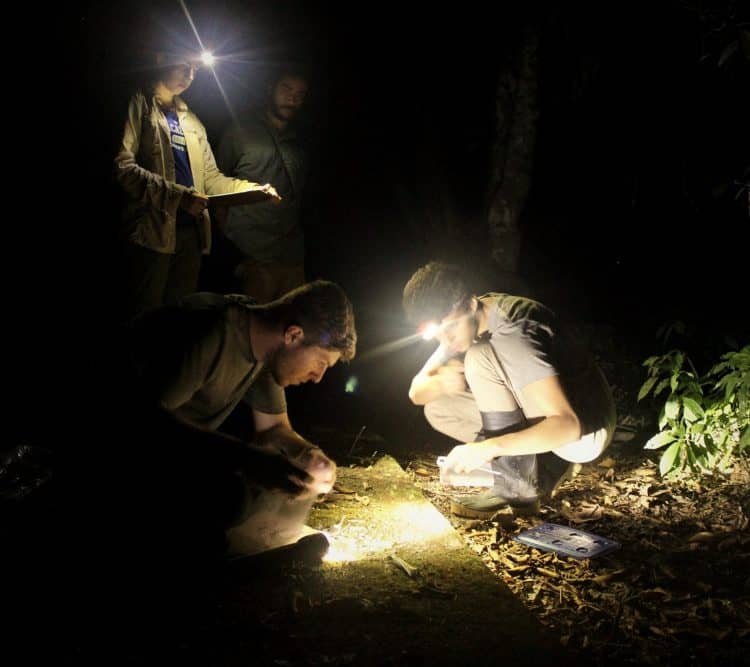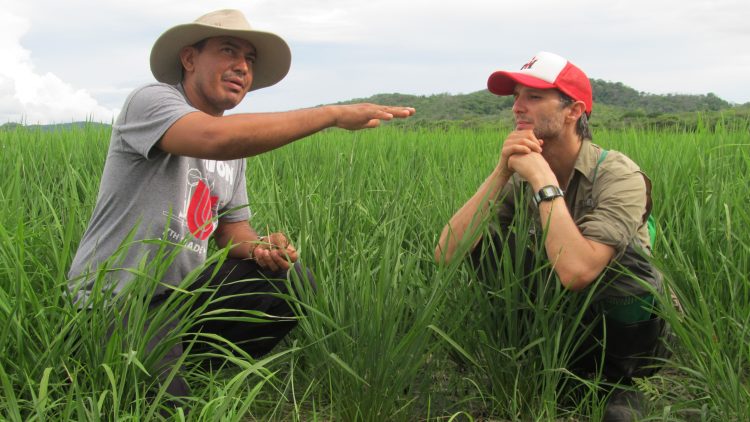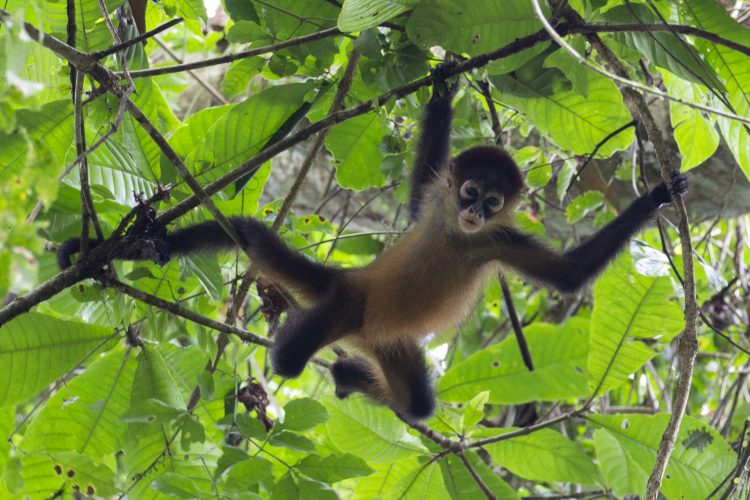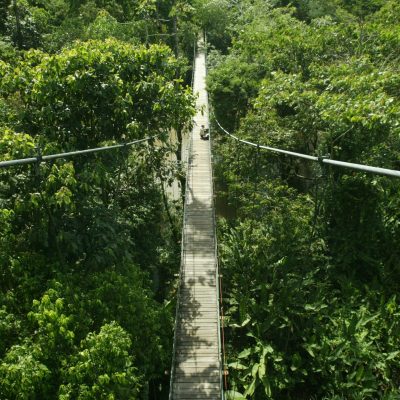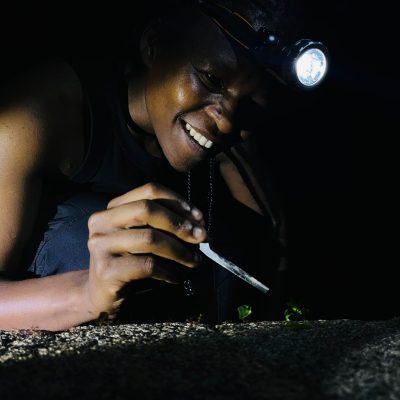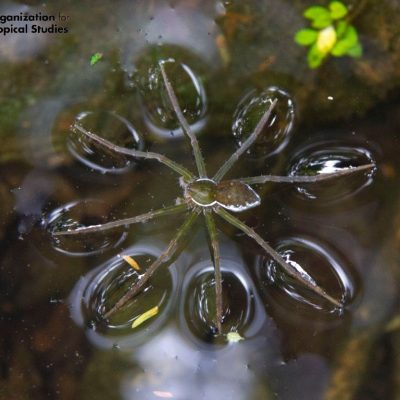Course Overview
Costa Rica’s unique diversity of ecosystems, from lowland tropical forests, to cloud forests, species rich wetlands, dry forests and diverse coastal systems will be your classroom as you study tropical ecology, conservation, methods in field research. The studies you’ll conduct during the course will not only start you on the path to becoming a successful tropical biologist but will also make valuable contributions to long-term datasets that help inform our understanding of tropical ecosystems.
The summer course in tropical biology is fast-paced and will engage you in some of the most critical issues facing tropical biodiversity and ecosystems today. During the four-weeks of the course, you will study in OTS’ three field stations in Costa Rica, giving you access to highly threatened tropical dry forests, lowland wet forests, and primary and secondary premontane wet forests. You’ll become familiar with the natural history of these diverse sites and engage in research under the mentorship of experts working at the field sites.
Studying with OTS in Costa Rica is a truly unique experience. Costa Rica is a biodiversity hotspot and is a model nation for conservation globally; it is committed to becoming the world’s first fully decarbonized country. OTS has been introducing students to ecology and conservation in Costa Rica since 1963 and has trained well over 10,000 students throughout the years, many of whom have gone on to work as scientists and conservationists.
Curriculum
The Tropical Biology summer course is worth 4 semester credits. Transcripts for this course will be provided by la Universidad de Costa Rica (University of Costa Rica).
Fundamentals of Tropical Biology (4 credits), Syllabus
This course integrates classroom and field instruction to introduce students to the fundamental principles of tropical biology and the natural history of tropical plants and animals. The ecological complexity of the tropics, the patterns of species diversity and the types of species interactions that characterize these systems are discussed in detail.
Schedule
The program will be fully engaging and will challenge you to develop skills in field biology. There are campus-like instructions (readings, lectures, discussion groups, etc.). There will also be orientation walks to learn about important plants, animals, diseases, local customs; you will perform field projects with long hours and take field trips to health facilities, towns, indigenous reservations, research facilities, banana plantations, logging sites, etc. There is one rest day per week, usually Sundays. In the field, your typical daily schedule may look like this:
6:30am, Breakfast: Rice and beans are a staple diet for Costa Ricans, and this is true even at breakfast. Most mornings will begin with gallo pinto, or rice and beans cooked together with onions, garlic, and other spices. This will often be accompanied by eggs, toast, fruit and coffee, juice or tea.
7:30am, Field activity: Most field activities take all morning, or in some cases will go into the afternoon. If the plan is to be out in the field until, for instance, 2pm or 3pm, you will take a bag lunch (usually a sandwich of your choice, fruit, cookies, and juice; and yes—bean sandwiches are an option). For field activities, you will often need to wear rubber boots, and always take water and your field notebook with you. This is the best part of the day—be prepared to get wet and muddy!!
12:00pm, Lunch back at the station: Whatever you have for lunch, it will almost certainly be accompanied by rice and beans.
1:00pm, Rest/shower time
2:00pm, Lectures and/or discussion sections: There will be schedule classroom activities in the afternoon to minimize the chances of getting caught outside in the rain. Lectures generally last 1- 1.5 hours each; discussions last an hour—sometimes longer if the topic is really interesting.
5:00pm, Free time: Most students use this space to go running, play soccer, rest, catch up on correspondence, etc.
6:00pm, Dinner: (You guessed it, among other offerings, rice and beans!)
7:00pm: There will often be evening lectures. Otherwise this time can be used for study time or relaxing.
Sites
You will be spending most of your time in four field stations operated by OTS, as well as visiting another. Below is a brief description of all the sites. Due to the number of rooms available to the course at each location, it may not always be possible to house all students of the same gender in separate quarters. Accommodations range from large rooms of bunk beds to smaller rooms for four to six people. Sites are subject to change.
Las Cruces Biological Station
Las Cruces Biological Station is nestled on the south Pacific slope of Costa Rica close to the town of San Vito, only a few kilometers from the Panamanian border. At 1,100 meters, Las Cruces is the site of the world famous Wilson Botanical Garden, which houses 10 hectares of native and non-native tropical plants, including bromeliads, palms, heliconias, and orchids. In 1983, UNESCO recognized Las Cruces as part of the international Amistad Biosphere Reserve. The station also protects 365 hectares of forest with a rich diversity of plants, mammals, birds, and other important organisms. Close to the station you will find a collection of forest patches that play a vital role in research on the biological dynamics of forest fragmentation, and restoration ecology. Las Cruces is one of the most comfortable of all the OTS field stations, and available services include internet, laundry, and hot water.
Las Alturas Biological Station
This premontane site is located in the southeastern region of Costa Rica and serves as a satellite station to Las Cruces. The forest at Las Alturas is adjacent to the enormous La Amistad National Park, which is the largest national park in Costa Rica, and extends into Panama, becoming a trans frontier protected area. This is a very rustic site with no internet access, limited electricity, phone for emergencies only, and large shared bunk rooms. It can be quite cool at this site, especially at night, so bring warm clothes. The station is located within a private reserve that also holds a farm that is occupied by a number of members of the Ngobe indigenous group. The adjacent forest includes a hike up the Cerro Chai, famed for an unusual montane cloud-loving flora at its peak.
La Selva Biological Station
Located in the Caribbean lowlands, La Selva is OTS’s largest field station and is one of the bestknown tropical research sites in the world. The station protects approximately 1,600 hectares of primary and secondary tropical rain forest. It averages 4,000 millimeters (over 13 feet) of rainfall a year. This lush environment facilitates the existence of thousands of species of plants and animals, making La Selva a great place to see all kinds of wildlife, including toucans, monkeys, ocelots, agoutis, peccaries, and the endangered green macaw. Two major rivers, the Sarapiquí and the Puerto Viejo, border la Selva. These rivers form part of the San Juan River Basin. La Selva is connected via a biological corridor with Braulio Carrillo National Park, which contains 46,000 hectares of forestland and ascends almost 3,000 meters in elevation to Volcán Barva, which overlooks the town of Heredia in the Central Valley. La Selva has an extensive trail system, lots of lab space, and is in general, a pretty busy place. The station can sleep over 100 people simultaneously. Important crops grown in the surrounding area include banana and heart of palm. Services available at include laundry and wireless internet. Telephone and fax are available in special circumstances. Showers may or may not have hot water. Housing consists of small dorm rooms with up to six students each.
Palo Verde Biological Station
Through an agreement with the Costa Rica National Park Service, OTS maintains this field station within the Palo Verde National Park. This reserve, located in the northwestern region of the country, lies on the boundary between an extensive marsh and seasonally dry forest underlain with limestone. It protects part of the lower Tempisque River Basin, the largest river drainage of the historic province of Guanacaste. Palo Verde is recognized internationally as one of the most important wetland habitats for nesting waterfowl. It is also a great place to see monkeys, deer, lizards, and crocodiles. Several trails lead to lookout points with incredible scenic vistas, favorite spots for watching the sunset. The park is currently impacted by rice and sugar cane cultivation in surrounding wetlands. It is also unique among Costa Rican parks in that domestic animals (namely, cattle) have been incorporated into its management program; a somewhat controversial decision that you will have a closer look at when you are there. The field station is rustic. Services available at Palo Verde include internet access and laundry. Palo Verde is the buggiest of the sites, particularly in the wet season, so be prepared for lots of mosquitoes while you are there!
Tuition
$7,000 for students from non-member institutions.
$6,000 for students from OTS member institutions.
Tuition and fees cover:
- Room and board at hotels, homestays, and research stations
- Local travel to program sites
- Participation of many local and international tropical scientists, and other experts
- Laundry costs
Tuition and fees do not cover:
- International travel
- Independent travel
- Incidentals
- Personal spending
Scholarships
OTS Scholarships
OTS is committed to providing opportunities to all eligible students interested in participating in our programs. We make every effort possible to ensure that financial obstacles are not the primary reason a qualified student cannot participate in one of our programs. We make scholarship applications available to students upon acceptance into an OTS program. We have a limited amount of scholarship funds available so, the earlier you apply, the better your chances of receiving an award. If you have questions, please contact the Enrollment Management team at undergraduate@tropicalstudies.org.
External Scholarships and Opportunities
The Benjamin A. Gilman International Scholarship Program
The U.S. Department of State’s Benjamin A. Gilman International Scholarship is a grant program that enables students of limited financial means to study or intern abroad, thereby gaining skills critical to our national security and economic competitiveness. The Gilman Scholarship is open to U.S. citizens and undergraduate students, who are receiving Federal Pell Grant funding at a two-year or four-year college or university, in order to participate in study and intern abroad programs worldwide. They award grants of up to $5,000 for traditionally underrepresented students in education abroad as well as students in the sciences, and nontraditional study abroad locations.
Fund for Education Abroad
The Fund for Education Abroad (FEA) invests in promising students with financial need who wish to study abroad. Scholarships range from $1,250 – $10,000. The student must be a U.S. citizen or permanent resident, be currently enrolled as an undergraduate at a college or university in the United States, the study abroad program must be eligible for credit at the student’s home institution, and the program must be at least 4 weeks in country. FEA encourages first generation, minority, and community college students to apply.
Additional Funding Sources
The Vira I. Heinz (VIH) Program for Women in Global Leadership
Corinne Jeannine Schillings Foundation Scholarship to Study Abroad
Boren Awards for International Study
Garden Club of America (GCA)
Phi Kappa Phi Study Abroad Grant
GoAbroad.com
Fund My Travel
Faculty
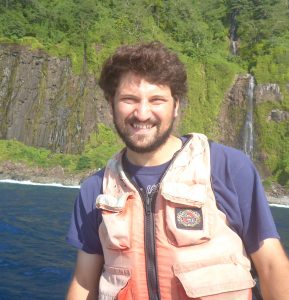
Darko Cotoras, Ph.D.
Darko is an evolutionary biologist interested in the study of the historical processes that create biodiversity in conditions of isolation. His main study group are spiders and other invertebrates present around the Pacific Ocean, with special attention to volcanic archipelagos and the Gondwanic land masses. He combines field and museum work with phylogenetics, population genetics and genome assembly. He is an assistant professor in evolutionary biology at the Pontificia Universidad Católica de Chile and a research associate at the California Academy of Sciences. Previously, he was a Humboldt postdoctoral fellow at the Senckenberg Museum working in the evolution of the color polymorphism of spiders endemic to the temperate rainforest of southern South America. Before that, as a postdoctoral researcher between the University of California, Santa Cruz and the California Academy of Sciences, he worked on improving ancient DNA methods for museum specimens in order to answer island biogeography questions. He earned his PhD from the University of California, Berkeley studying an adaptive radiation of Hawaiian spiders. His Master in Ecology and Evolution, and Bachelors in Biology are from the Universidad de Chile. He has been coordinator, co-coordinator and faculty on several OTS courses.
Housing/Meals
This is a fast-paced, field-based course with significant travel throughout the country. Though you may have one or two roommates on campus at your home institution, in Costa Rica you will be living closely with close to 15 other students and two to five professors or field assistants. This means communication and respect will be crucial. Everyone needs to be as open, honest, and cooperative as possible. You also need to have sincere respect for one another, regardless of different opinions and lifestyles. This includes respect for privacy, respect for rules and regulations, and even respect for the fact that unpredictability is an inherent feature of field-based programs. Indeed, next to communication and cooperation, flexibility and a good sense of humor are the most important characteristics of a successful student in the program. The upside of a field-based program, of course, is that you will undoubtedly develop a number of very close friendships. The combination of uncomfortable (being wet, muddy, and tired) and wonderful (watching iguanas sunning on the bridge at La Selva) situations creates great images and memories. You will share these with your fellow participants well beyond the end of the summer.
Passport & Visa Information
You must have a valid Passport to travel to Costa Rica. It is important that the passport does not expire within 6 months of your last day in Costa Rica. If you are NOT a citizen of a North American or European country, you will probably need a special visa to get into Costa Rica. We recommend that you contact your respective consulate or embassy services to determine if you need a visa to travel to Costa Rica for the length of the course (4 weeks). It is important to take into account the requirements to get a visa approved before you apply for one of our courses. If you are accepted into one of our programs we will provide any information necessary (within reason) to help with the visa application.
Please keep in mind that visa application processes can take several months depending on the country of issue. For more information on this topic please visit this website. U.S. citizens entering Costa Rica are automatically granted a 90-day tourist Visa. Students planning to stay in Costa Rica after the program end date need to take this into account. Please contact the Enrollment Management team at undergraduate@tropicalstudies.org if you have any questions.
Health & Safety
OTS is deeply committed to student safety and well-being, we do not expose students to unnecessary danger or risk. We monitor national and international events that might affect our students. Five decades of risk assessment, emergency response, and crisis resolution have enabled OTS to maximize student safety and security. All students participate in an on-site orientation program upon arrival. You can also check the US State Department for specific recommendations for Costa Rica here. For our most current safety information, contact the OTS Enrollment Management staff at undergraduate@tropicalstudies.org.
Covid-19 Vaccination Policy
To participate in an OTS, field-based program, OTS highly recommends that students be vaccinated against Covid-19. All students and staff must adhere to all health and safety measures related to Covid-19 and/or any other public health concern.
For information on OTS’ Covid-19 policies please review the FAQ’s for Study Abroad.
